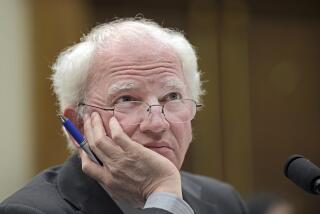Stephen Glass finds tough audience at California Supreme Court
SACRAMENTO -- The California Supreme Court appeared unwilling Wednesday to grant a law license to a former journalist who fabricated stories for national magazines but now says he is steadfastly honest.
During a hearing in Sacramento, several justices of the state high court indicated they were not convinced that Stephen Glass, 41, who concocted articles for the New Republic and other magazines in the mid-1990s, had shown enough evidence of rehabilitation to be permitted to practice law.
Justice Joyce L. Kennard spoke at length of articles that Glass had fabricated and the importance of honesty in the law.
Chief Justice Tani Cantil-Sakauye observed that Glass was involved in a “a depth of deception that was pretty sophisticated.”
Justice Marvin Baxter noted that Glass’ prior conduct was not an isolated incident, but a pattern “over a long period of time.”
Justice Ming W. Chin said Glass had benefited from his misconduct by earning money from a novel he wrote about his experience.
As the court’s leanings became increasingly clear, Glass appeared to slump in his chair. Dressed in a suit and tie, he was seated near the front of the ornate courtroom next to his fiancee. He declined to comment afterward and left the courthouse alone with his girlfriend, his hands in his pockets and his head down.
Glass wrote 42 magazine stories that were wholly or partially fabricated before he was caught in 1998. He was in his mid-20s. He made up phony notes, a fictional website, fake business cards and bogus voice-mail messages to try to cover up his fabrications.
After leaving journalism in disgrace, Glass graduated from Georgetown Law School and applied for admission to the New York bar but withdrew that application after learning he would be rejected on moral grounds. He eventually moved to California, settling in Los Angeles, and landed a job at a personal injury law firm.
The California bar denied Glass a law license in 2009, but a state bar court approved him for admission after a 10-day confidential bar trial. A bar committee in charge of admissions appealed, and a bar appeals court also ruled for him. The bar committee then asked the California Supreme Court to deny him a license.
The Supreme Court is to rule on Glass’ case within 90 days.
ALSO:
Family of Santa Monica Airport crash victim sues pilot’s estate
Man who jumped to death from helicopter in Newport Beach identified
Amber Alert suspect’s SUV reportedly spotted in San Diego, CHP says
Twitter: @mauradolan
maura.dolan@latimes.com
More to Read
Sign up for Essential California
The most important California stories and recommendations in your inbox every morning.
You may occasionally receive promotional content from the Los Angeles Times.










